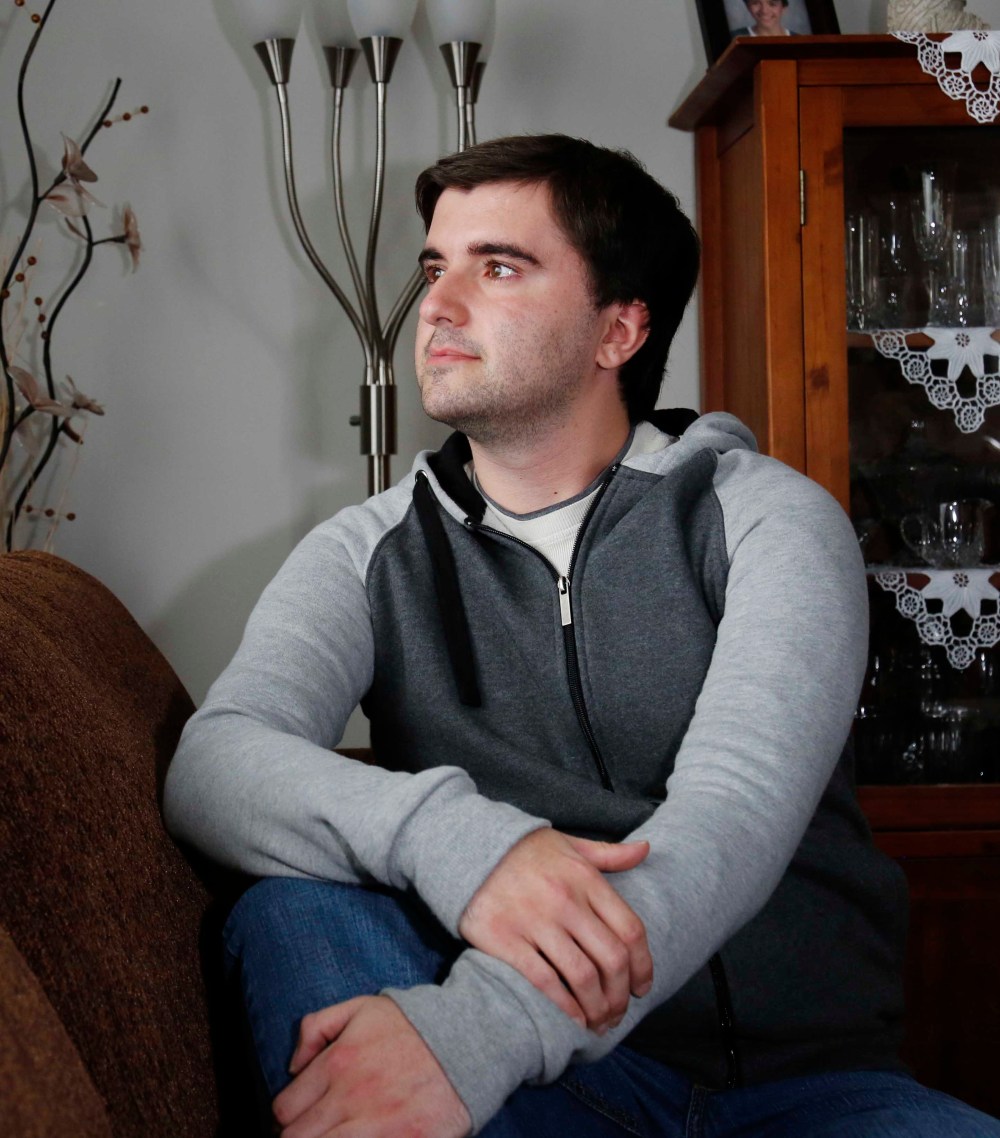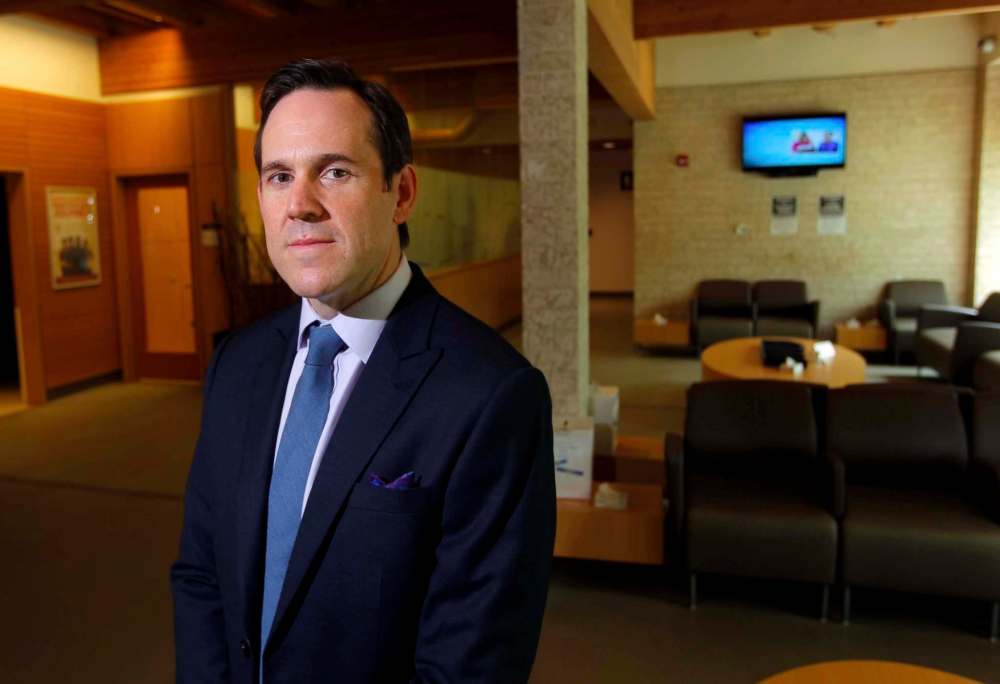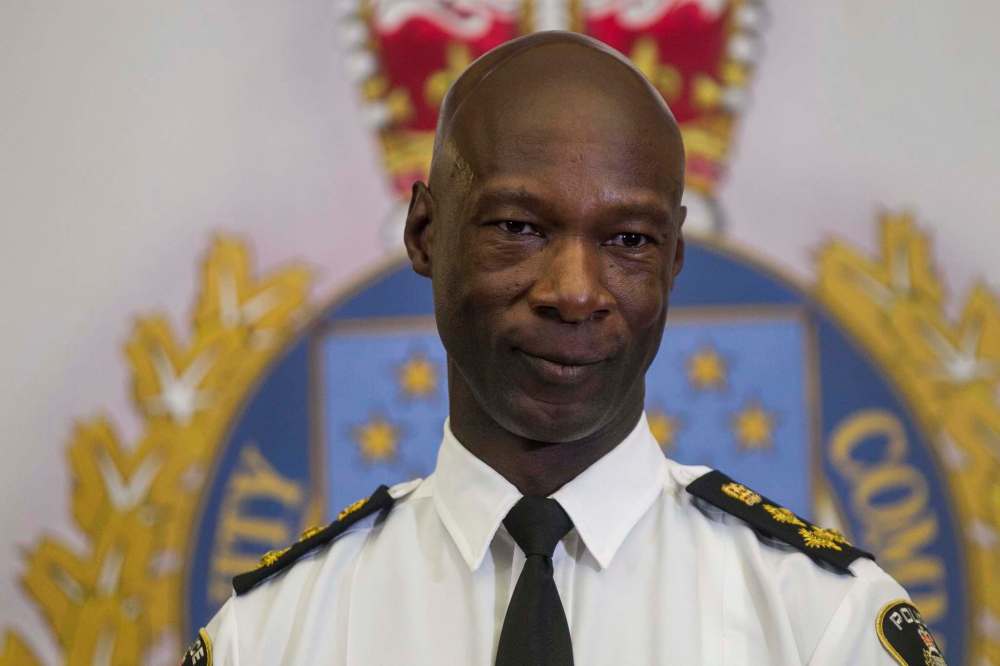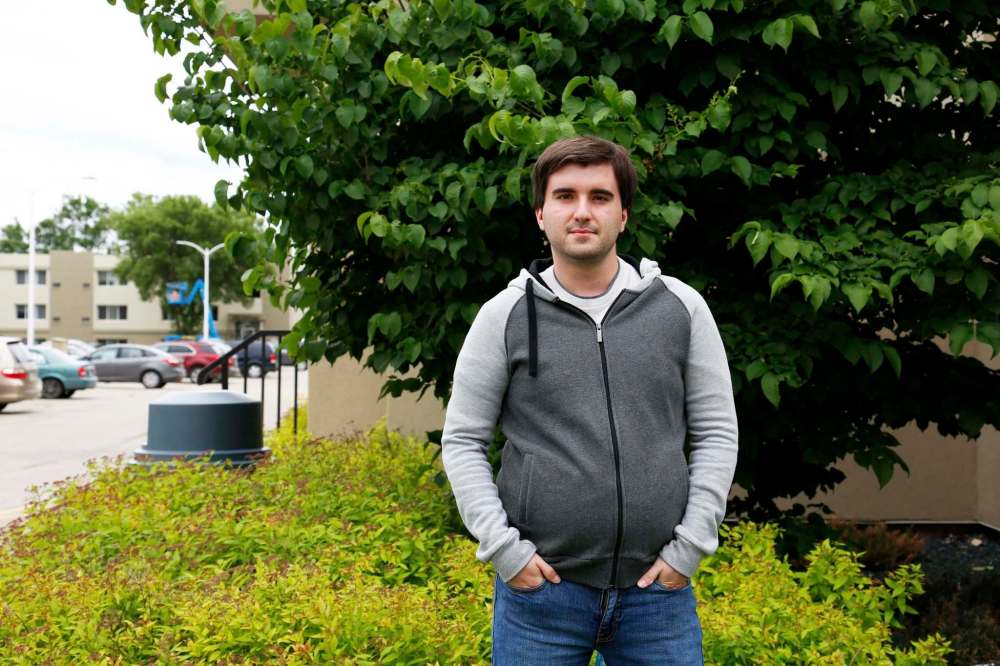Costly compassion Winnipeg police are trained to offer sensitive support to an ever-growing number of people in mental-health crises, but it takes officers off the street; everyone on the front lines agrees there are better ways to help
Read this article for free:
or
Already have an account? Log in here »
To continue reading, please subscribe:
Monthly Digital Subscription
$1 per week for 24 weeks*
- Enjoy unlimited reading on winnipegfreepress.com
- Read the E-Edition, our digital replica newspaper
- Access News Break, our award-winning app
- Play interactive puzzles
*Billed as $4.00 plus GST every four weeks. After 24 weeks, price increases to the regular rate of $19.95 plus GST every four weeks. Offer available to new and qualified returning subscribers only. Cancel any time.
Monthly Digital Subscription
$4.99/week*
- Enjoy unlimited reading on winnipegfreepress.com
- Read the E-Edition, our digital replica newspaper
- Access News Break, our award-winning app
- Play interactive puzzles
*Billed as $19.95 plus GST every four weeks. Cancel any time.
To continue reading, please subscribe:
Add Free Press access to your Brandon Sun subscription for only an additional
$1 for the first 4 weeks*
*Your next subscription payment will increase by $1.00 and you will be charged $16.99 plus GST for four weeks. After four weeks, your payment will increase to $23.99 plus GST every four weeks.
Read unlimited articles for free today:
or
Already have an account? Log in here »
Hey there, time traveller!
This article was published 06/07/2017 (3118 days ago), so information in it may no longer be current.
There are no sirens blaring and no lights flashing when a police cruiser pulls up in front of Ben Sabic’s home.
“I can’t do this anymore,” the 21-year-old University of Manitoba student told his friends over the phone 20 minutes ago.

The young man is sitting on his lawn in the dark, cellphone in hand, having a quiet breakdown. He just wants a ride to where he can get urgent psychiatric care; he doesn’t want to get police involved. But they are.
One of the two uniformed male officers gets out of the cruiser, walks over and sits down beside him.
“Hey, buddy,” the officer says, his tone relaxed. “We heard you’re having a rough time.”
Over the past decade, mental-health-related calls to Winnipeg police have nearly doubled, prompting intensified training for front-line officers who now interact with more people in crisis than ever before. The police data, obtained and analyzed by the Free Press, show dispatched 911 calls classified as suicide threats or involving in-hospital mental-health assessments have risen steadily without respite. Between 2006 and 2016, the Winnipeg Police Service logged a 99 per cent increase in mental-health-related calls, while total calls to police have gone up about 35 per cent. There were 2,581 mental-health-related calls to city police in 2006, and by last year, that number had surged to 5,127. Across Manitoba, RCMP dealt with a 38 per cent increase in mental-health calls between 2012 and 2016.
if(“undefined”==typeof window.datawrapper)window.datawrapper={};window.datawrapper[“KZ2lA”]={},window.datawrapper[“KZ2lA”].embedDeltas={“100″:773.8,”200″:561.8,”300″:518.8,”400″:502.8,”500″:502.8,”600″:477.8,”700″:477.8,”800″:460.8,”900″:460.8,”1000”:460.8},window.datawrapper[“KZ2lA”].iframe=document.getElementById(“datawrapper-chart-KZ2lA”),window.datawrapper[“KZ2lA”].iframe.style.height=window.datawrapper[“KZ2lA”].embedDeltas[Math.min(1e3,Math.max(100*Math.floor(window.datawrapper[“KZ2lA”].iframe.offsetWidth/100),100))]+”px”,window.addEventListener(“message”,function(a){if(“undefined”!=typeof a.data[“datawrapper-height”])for(var b in a.data[“datawrapper-height”])if(“KZ2lA”==b)window.datawrapper[“KZ2lA”].iframe.style.height=a.data[“datawrapper-height”][b]+”px”});
The numbers capture only part of the picture when it comes to police interactions with mentally ill individuals, since countless other calls for help that may stem from mental-health issues are never categorized as such, and some calls that were logged as mental-health-related may have turned out not to be. Yet, the fact that one in five Canadians will experience a mental-health problem has become an oft-cited statistic in health-care and policing circles alike. And of the the five million people who came into contact with police across the country in 2012, one in five had some type of mental or substance-abuse disorder, according to a Statistics Canada study.
The sheer number of calls has raised questions about the public’s propensity to dial 911, how police respond and whether law enforcement is best poised to handle individuals in mental distress.
“I think people are more apt to call, and call before something really scales out of control," says WPS deputy chief Gord Perrier, adding more prominent public conversations about mental health have reduced stigma attached to coming forward.
Phone numbers
WRHA Mobile Crisis Service Phone Line: 204-940-1781
Klinic Crisis Line: 204-786-8686 or 1-888-322-3019
Kids Help Phone: 1-800-668-6868
"People are aware of early warning signs, I think, more often than not, and we’ll get that information sooner. I mean, if you’re dealing with somebody in crisis, the sooner you can engage, often the better the result.”
It’s sometimes referred to as "mental-health literacy" — the idea that increased public awareness of mental-health problems has led to greater demand for urgent help.
“This is a phenomenon that we see across several western nations," says Dr. James Bolton, Winnipeg Regional Health Authority’s medical director of crisis response services, citing rapidly rising mental-health-related emergency room visits in Canada, the United States and the United Kingdom.
“Depression is the No. 1 cause of disability in First World nations around the world now. It has eclipsed other health conditions, and that just shows you the kinds of health problems that are affecting developed nations," he says.
Walk-in visits to the WHRA’s 24-hour Crisis Response Centre hit 7,500 last year, up from 5,000 when the centre opened in 2013. While the majority of people in crisis show up to the voluntary urgent care centre without a police escort, officers are there almost every day, "usually in a very subtle manner," he says.
They work hard getting people who need help to the facility, but a near-constant police presence isn’t necessary, he says.

“We shouldn’t have to rely on police every time," Bolton says. "Ideally, as recognition around mental health builds, we get to a point where individuals themselves, their family members, their friends and their treatment services work in closer and closer collaboration so that people can come and get the help that they need before things become a crisis."
Although suicide threats and mental-health assessment calls accounted for only about 2.5 per cent of total dispatched calls for service in 2016, they represent one of the most urgently escalating categories of calls to police, and one that consistently keeps officers occupied. Each mental-health call takes an average of 11 hours to complete, according to data from 2011 to 2015. Winnipeg police — or in some cases, cadets — spend more time dealing with mental health-related calls than reported stabbings, assaults and residential break-and-enters combined.
Under Manitoba law, peace officers must wait with individuals in distress until they are seen by a medical professional — sometimes translating into an entire shift in a hospital waiting room. Last summer, the provincial government announced a change to the Mental Health Act that would allow "a qualified person" — not specifically a peace officer — to wait with people. But the amendment has yet to come into effect. The province is still in the planning stages to "ensure appropriate human resources are in place," a government spokeswoman says.
Retired WPS chief Devon Clunis says there were many days where he spent an entire 10-hour shift at the hospital with someone dealing with a mental-health crisis and unfortunately that is still the case today. He calls it one the "greatest burdens" on the police service.
“Policing has to change," Clunis says. "The fact is that we often are the first responders dealing with people in mental-health crisis, but we need to have other components of the community who are able to alleviate that burden for police so they can continue to deal with what’s been traditionally a police responsibility."

During his nearly 30-year career, including more than three years at the helm, Clunis says he recognized mental health as one of the most pressing issues facing the police force – both on city streets and within its own ranks.
“This is something that’s escalating, but it’s something that can only be resolved with a community approach,” he says now, as one of the mental-health advocates serving on a national committee for the Centre for Addiction and Mental Health.
“It can’t just be the police service. It can’t just be the medical system. Where the real power lies is in the community, and when we all get on board and realize we all have a role to play, then we can resolve these things in a very healthy fashion, in a very cost-effective fashion.”
Clunis says Winnipeg, because of its socio-economic needs, may be prone to seeing more of its residents in crisis, especially since poverty and health concerns often go hand in hand.
“So if we’re not able to help our people deal with that effectively, it will impact our city long term,” he says.
“We have to look at the why. That’s really where real solutions will come from, and that will take some time. Because otherwise all we’ll be doing is responding to the symptoms.”
The police service has expanded its training for dealing with people in mental-health crisis, focusing on practising de-escalation techniques that officers learn through role-playing scenarios. The WPS plans to roll out the enhanced training to 1,500 officers by the end of next year. As of a few weeks ago, 76 officers, including new recruits, had received the training.
“That increase in training has been because of an increase, somewhat, in calls, but also there’s been some tragic events across the country that have involved mental-health and ended in a difficult way for everybody…" Perrier says. "We are always searching for ways that don’t result in those types of situations unfolding as they have.”
• • •
When Terry Coleman, a police officer-turned mental-health researcher, was enrolled in basic training in the Calgary Police Service more than 40 years ago, the words “mental health” were scarcely uttered.
If the subject was broached at all, “we didn’t have specialized training in it,” he says. “It was all very vague.”
“I don’t think we had the patience at the time, I don’t think we had the full understanding of what was going on, and I think we could’ve done a much better job, myself included.”
Coleman, now an adjunct professor at the University of Regina, has been working with psychologist Dorothy Cotton on the intersection between mental-health services and policing for more than 15 years. Together, they developed police training recommendations for the Mental Health Commission of Canada that emphasized partnerships between police and mental-health professionals.
He believes police services across the country should implement their own mental-health strategies and team up with health-care providers to more effectively respond to individuals in crisis. That kind of work is already being done in Vancouver and Hamilton through a crisis outreach team of mental-health workers and plainclothes police officers.
“Police taking this on alone is not a good idea," he says. "It requires working with the mental-health people, because if you have mental-health people working with you, very often there’s alternatives to taking the person to the hospital."
"Law enforcement’s just a very small part of policing; it’s an important part, but policing is a human service," he adds. "We react to social issues. This is one of them and it’s very much part of police work. So we have to deal with it.”
Winnipeg’s police force doesn’t have its own mental-health strategy, but for the past six years, it’s been part of a joint-operations committee with regional health vice-presidents who help guide police policies. The force is working on closer ties to health services, including sharing more police-gathered information with health-care agencies to inform someone’s medical treatment, Perrier says.
Teamwork between police and social workers has been "old hat" through WPS’s decade-old vulnerable persons unit, he says.
What has "really changed the game," Perrier says, is the addition of an Edmonton-developed mental-health awareness training program that teaches officers how to respond based on the needs of the person they’re dealing with.
When the police service brought in the enhanced training last year, mental-health professionals were directly involved for the first time, offering tips for improvement as they observed officers’ role plays, which included scenarios on addictions, depression, suicidal thoughts and schizophrenia.
“For the most part, what we are finding is that intuitively, they’re very well-equipped to handle these scenarios in a way that aligns with that recovery-oriented, person-first approach" that makes people feel comfortable, said Sean Miller, partnership for recovery co-ordinator with the Canadian Mental Health Association in Winnipeg.
"They don’t want the public necessarily to see the uniform first. They want to demonstrate a willingness to help someone, and they do that by using their first name, not rattling off their file and rank. So it’s not something where they’re going in to dominate. They’re going in, really, as shoulder-to-shoulder and concerned about helping people," he says.
The officers who showed up to take him to the hospital were much the same — calm, conversational. It was 2005, and Miller was at the tail end of his own mental-health crisis, asking his wife to get someone to take him to the hospital.
“With a lack of knowledge about whom to call, she dialed 911. So the police showed up, and it was a very, very positive experience for me," he says. "It wasn’t traumatic whatsoever.
“They dealt with it in a very calm manner in my situation, and certainly since we’ve formed that partnership (between police and CMHA), I’ve seen that as a consistent quality, if you will, of all of the officers that we’ve dealt with.”
Training is critical, Miller says, because if the first response to someone in crisis is a negative experience for them, they may never get the help they need. But, he adds, there’s room to push beyond most people’s propensity to call 911 and focus instead on prevention programs.
More than ever before, people recognize the signs of mental illness and they know they should get help, but they don’t always know where to turn.
“We need to catch up in terms of creating an awareness of the resources available to people so that they aren’t necessarily immediately picking up the phone and calling police," Miller says.
Calling for help
Calls to the Winnipeg Regional Health Authority’s crisis phone line numbered more than 11,000 last year, in addition to 7,500 visits to the 24-hour Crisis Response Centre. There’s a definite need, Dr. James Bolton says, for immediate care that provides followup services for people in crisis. The Crisis Response Centre refers about 100 people per month to its Urgent Follow Up Integrated Treatment Team (UFITT). There were about 1,200 referrals last year.
“One of the gaps that I’ve seen over time is the lack of availability of urgent care for people in crisis. That has been a gap for a long time in the system. There are small groups working hard in that area, but it’s an area that we need to improve and that’s why we’ve worked so hard to develop the UFITT program at the CRC,” Bolton says.
The Crisis Response Centre offers walk-in mental-health assessments for people in crisis who are non-violent and show up voluntarily.
Bolton says families and loved ones can often spot red flags if someone they know starts withdrawing from school, work and social activities or stops doing things they used to enjoy. Symptoms are specific to the particular mental-health disorder, but some common ones are a depressed mood, changes in sleep, no appetite, being anxious in public and abusing drugs. Signs that someone is in crisis include feeling detached from reality, hearing voices or feeling life isn’t worth living or they want to die.
“It’s a much bigger picture than, OK, we hit the panic button — who should come and address this situation?”
Some local mental-health advocates are focusing on a different kind of training, one they hope will put less emphasis on law enforcement as the first response.
“It’s a travesty right now that a first point of access to a health-care system is through the police force,” says Tara Brousseau Snider, executive director of the Mood Disorders Association of Manitoba. The non-profit has seen the need for its services increase nearly tenfold over the past decade, ballooning from 10,000 contacts with individuals and families to 95,000 annually.
“The police do a very good job with what they do, but I’m just not sure that in an illness-based (incident), we as a society should be having the police coming as frequently as they are. I think there are other options that we could be using.”
One alternative, Brousseau Snider suggests, involves harnessing the power of "I’ve been there."
The Mood Disorders Association is training more than 40 people who’ve lived with mental illness to become peer support workers this summer, in hopes they’ll one day become regular fixtures in city emergency rooms to help people in times of crisis. The trainees are learning how to share their own stories respectfully, in ways that calm people in crisis, make them feel heard and help them understand they’re not alone.
“If you’ve felt suicidal in the past, then you can have a different kind of conversation with someone who’s feeling that way now, (compared with) someone who’s never felt like that,” says Robyn Priest, an Australia-born, Texas-based consultant with Resiliency Unleashed, who has trained peer support workers in 10 countries.
“Part of the beauty of peer support is that you can share some of your tools, techniques, ways that you got through it."
Priest, who has bipolar disorder, has helped launch peer support programs in Ontario, including one that places workers in Ottawa hospitals.
“They’re seeing that people are actually calming down a lot quicker, and sometimes people don’t need extra support if they’ve had peer workers," she says, pointing to studies showing mentally ill people who have access to peer support spend less time in hospital.
“I think we need to be bold and brave and start putting peer support in, because all of the research shows that it actually supports people to get well quicker," she says.
“I want to see people get to a place where their souls aren’t destroyed and they’re told, ‘Actually, this is OK. We can support you with this and you can have a great life.’”
• • •

The need for support is always growing, as evidenced by the 5,127 mental-health 911 calls last year alone.
One of them was for Sabic, the young man officers encountered on his lawn.
Sabic had been diagnosed with bipolar disorder, social anxiety and hypochondria, and was on a waiting list for psychiatric care. He’d been taking care of himself, seeing a private nurse practitioner regularly and a social worker once a month to get a handle on his mental health. But on that mid-November evening he was home alone and his mind was racing.
He started to lose hope, started to think about how he couldn’t go on. He didn’t know what he would do, but he knew he needed help. He called a couple of friends, told them he thought he might kill himself, and asked them if they’d take him to the WRHA crisis response centre. They called 911.
“To some individuals, depending on their state of mind, calling the police can immediately drive them over the edge,” Sabic says now, months later, after getting help. “If you see a police cruiser show up, you immediately feel like you did something wrong or that you committed a crime or that what you’re feeling isn’t OK.”
Although he had a relatively positive experience with police, Sabic says he couldn’t help thinking he had no business in the back of a police car.
“It kind of felt like I was a burden to the officers, because I was thinking, ‘Well, they shouldn’t have to take me, one of my friends could have taken me.’ I felt like, in a way, I was wasting their time, because while they were driving me to the centre I was thinking, ‘What happens if someone in the next house over gets robbed?’ as silly as that sounds.”
Police waited with him — for about an hour — until he was seen by a psychiatric nurse. By the time he left later that night, Sabic says he felt safer, more relaxed. Still, he says he would have been more comfortable meeting with a crisis counsellor instead of being patted down by police that night.
Since then, he’s continued in his advocacy work to help others who have been diagnosed with mental-health conditions, including as part of a national youth advisory council for Kids Help Phone. He says it’s important for people not to be afraid to seek support.
“Everyone from police officers to hospital staff to psychologists are just there to support you and they’re not going to judge you and you shouldn’t be afraid to open up to your family and friends. Because if I hadn’t opened up to my two friends at the time, I’m not sure if I would be here today,” Sabic says.
katie.may@freepress.mb.ca
Twitter: @thatkatiemay

Katie May is a multimedia producer for the Free Press.
Our newsroom depends on a growing audience of readers to power our journalism. If you are not a paid reader, please consider becoming a subscriber.
Our newsroom depends on its audience of readers to power our journalism. Thank you for your support.
